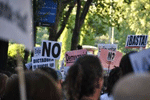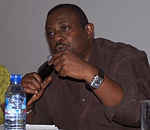Published on Thu, 2011-09-08 08:58
Source: Blog of the Conference, UN News Centre, South-South News The annual joint meeting of the United Nations (UN) and non-governmental organizations (NGOs) convened this week in Bonn, Germany, concluded with the presentation of a lengthy declaration that calls heads of state or government to represent their countries in next year’s UN Conference on Sustainable Development (Rio+20) in Brazil, and for the adoption of an extensive and politically-binding set of international goals and national commitments. |
Published on Wed, 2011-09-07 09:24
Sources: CEM-H, Minga Informativa de Movimientos Sociales, El Heraldo The civil society organizations that make up the Commission against Femicide (the murder of women) in Honduras expressed last week their indignation and concern at the increase in this phenomenon in the country and the fact that the authorities are showing "little or no interest" in it. They warned that “Femicide is an extreme expression of violence against women based on men’s power to control and dominate us, our bodies and our lives". |
Published on Tue, 2011-09-06 09:02
Sources: Agenda Global, Tax Justice Network América Latina, Latindadd In Latin America in the last ten years the tax yield has increased thanks to relative stability and macroeconomic growth driven by demand from emerging countries and rising prices for prime materials, but this has not been enough to overcome the problem of fiscal sustainability. This is because of obstacles like dependence on the international context, debt service payments, ineffective management of government policies, informality and tax evasion. Another aspect is that the tax systems in the region put a disproportionately heavy burden on the poorest and most vulnerable sectors of the population. This situation will be discussed by government officials, experts and activists in Lima this week at a meeting convoked by the Latin American Network on Debt, Development and Rights (Latindadd). |
Published on Mon, 2011-09-05 08:12
Source: Plataforma 2015 y Más The main union federations in Spain and many civil society organizations including Plataforma 2015 y Más (a member of Social Watch) established last week a programme of demonstrations to express their rejection of the change to the Constitution the governing Spanish Socialist Workers Party (PSOE) and the opposition Popular Party (PP) are contemplating. The change would set a limit to the public deficit, and the people’s organizations are calling for a public referendum to decide this matter. |
Published on Fri, 2011-09-02 07:24
Sources: BusinessGhana, ThinkGhana, Ghana Business News, MyJoyOnline, GhanaWeb, AllAfrica Several Ghanaian civil society organizations warned that the renewal of the interim Economic Partnership Agreement (EPA) between the country and the European Union (EU) will condemn the Western Africa integration process and the national economy to an irreparable doom. The Third World Network-Africa (TWN-A, focal point of Social Watch), the General Agricultural Workers Union (GAWU), the Integrated Social Development Centre (Isodec) and Abantu for Development, among other groups, said the government must not give in and sign an agreement which will be harmful to the long-term development goals and aspirations of the country. |
SUSCRIBE TO OUR NEWSLETTER







